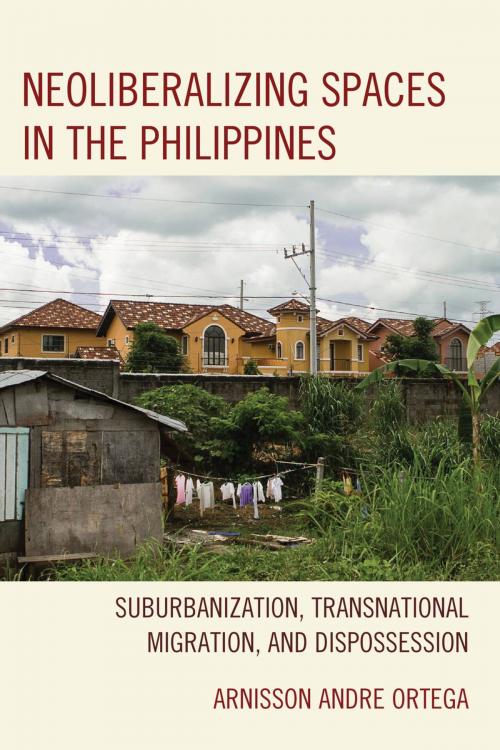Neoliberalizing Spaces in the Philippines
Suburbanization, Transnational Migration, and Dispossession
Nonfiction, History, Asian, Southeast Asia, Social & Cultural Studies, Political Science, International, Social Science| Author: | Arnisson Andre Ortega | ISBN: | 9781498530521 |
| Publisher: | Lexington Books | Publication: | September 9, 2016 |
| Imprint: | Lexington Books | Language: | English |
| Author: | Arnisson Andre Ortega |
| ISBN: | 9781498530521 |
| Publisher: | Lexington Books |
| Publication: | September 9, 2016 |
| Imprint: | Lexington Books |
| Language: | English |
Amidst the recent global financial crisis and housing busts in various countries, the Philippines’ booming housing industry has been heralded as “Southeast Asia’s hottest real estate hub” and the saving grace of a supposedly resilient Philippine economy. This growth has been fueled by demand from balikbayan (returnee) Overseas Filipinos and has facilitated the rise of gated suburban communities in Manila’s sprawling peri-urban fringe. But as the “Filipino dreams” of successful balikbayans are built inside these new gated residential developments, the lives of marginalized populations living in these spaces have been upended and thrown into turmoil as they face threats of expulsion.
Based on almost four years of research, this book examines the tumultuous geographies of neoliberalization that link suburbanization, transnational mobilities, and accumulation by dispossession. Through an accounting of real estate and new suburban landscapes, it tells of a Filipino transnationalism that engenders a market-based and privatized suburban political economy that reworks socio-spatial relations and class dynamics. In presenting the literal and discursive transformations of spaces in Manila’s peri-urban fringe, the book details life inside new gated suburban communities and discusses the everyday geographies of “privileged” new property owners—mainly comprised of balikbayan families—and exposes the contradictions of gated suburban life, from resistance to Home Owner Association rules to alienating feelings of loss. It also reveals the darker side of the property boom by mapping the volatile spaces of the Philippines’ surplus populations comprised of the landless farmers, informal settler residents, and indigenous peoples. To make way for gated communities and other profitable developments in the peri-urban region, marginalized residents are systematically dispossessed and displaced while concomitantly offered relocation to isolated socialized housing projects, the last frontier for real estate accumulation.
These compelling accounts illustrate how the territorial embeddedness of neoliberalization in the Philippines entails the consolidation of capital by political-economic elites and privatization of residential space for an idealized transnational property clientele. More than ever, as the Philippines is being reshaped by diaspora and accumulation by dispossession, the contemporary moment is a critical time to reflect on what it truly means to be a nation.
Amidst the recent global financial crisis and housing busts in various countries, the Philippines’ booming housing industry has been heralded as “Southeast Asia’s hottest real estate hub” and the saving grace of a supposedly resilient Philippine economy. This growth has been fueled by demand from balikbayan (returnee) Overseas Filipinos and has facilitated the rise of gated suburban communities in Manila’s sprawling peri-urban fringe. But as the “Filipino dreams” of successful balikbayans are built inside these new gated residential developments, the lives of marginalized populations living in these spaces have been upended and thrown into turmoil as they face threats of expulsion.
Based on almost four years of research, this book examines the tumultuous geographies of neoliberalization that link suburbanization, transnational mobilities, and accumulation by dispossession. Through an accounting of real estate and new suburban landscapes, it tells of a Filipino transnationalism that engenders a market-based and privatized suburban political economy that reworks socio-spatial relations and class dynamics. In presenting the literal and discursive transformations of spaces in Manila’s peri-urban fringe, the book details life inside new gated suburban communities and discusses the everyday geographies of “privileged” new property owners—mainly comprised of balikbayan families—and exposes the contradictions of gated suburban life, from resistance to Home Owner Association rules to alienating feelings of loss. It also reveals the darker side of the property boom by mapping the volatile spaces of the Philippines’ surplus populations comprised of the landless farmers, informal settler residents, and indigenous peoples. To make way for gated communities and other profitable developments in the peri-urban region, marginalized residents are systematically dispossessed and displaced while concomitantly offered relocation to isolated socialized housing projects, the last frontier for real estate accumulation.
These compelling accounts illustrate how the territorial embeddedness of neoliberalization in the Philippines entails the consolidation of capital by political-economic elites and privatization of residential space for an idealized transnational property clientele. More than ever, as the Philippines is being reshaped by diaspora and accumulation by dispossession, the contemporary moment is a critical time to reflect on what it truly means to be a nation.















